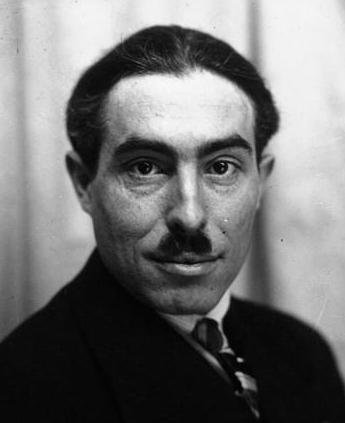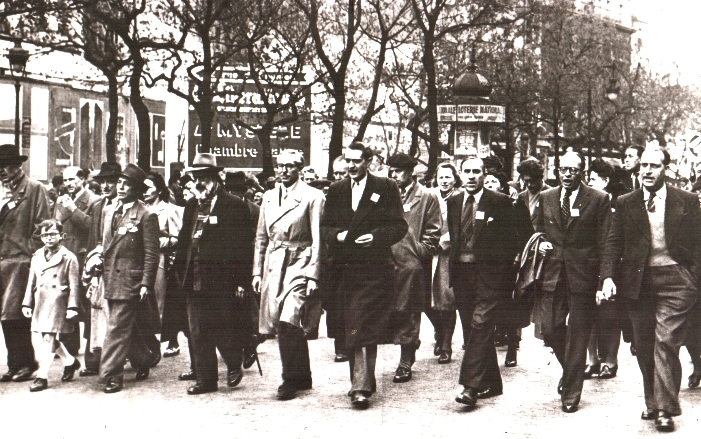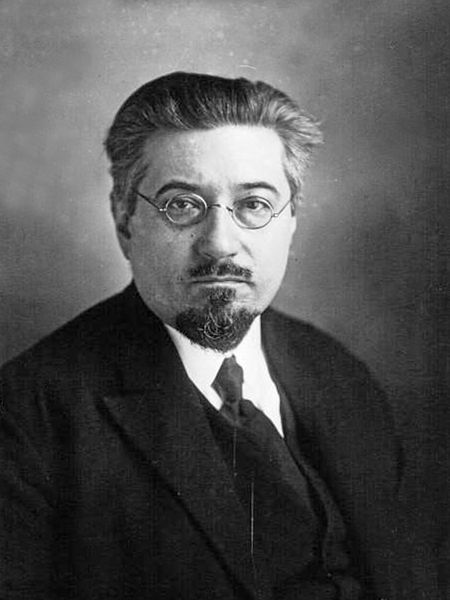<Back to Index>
- Socialist Militant Marceau Pivert, 1895
- Prime Minister of France Paul Ramadier, 1888
PAGE SPONSOR


Marceau Pivert (1895, Montmachoux, Seine - et - Marne – 1958) was a French schoolteacher, trade unionist, Socialist militant and journalist. He was an alumnus of the École normale supérieure de Saint - Cloud.
Active in the Syndicat National des Instituteurs (SNI), a staunch supporter of laïcité and a pacifist after service in World War I, Pivert joined the Socialist Party (PS) and then the French section of the Workers' International (SFIO) wing under Léon Blum (the section of the Party that had refused in 1920 adherence to the Comintern, as opposed to the new French Communist Party, PCF).
In the early 1930s, Pivert grouped the most left wing members of the SFIO in his Gauche Révolutionnaire ("Revolutionary Left") tendency, to which Daniel Guérin was a member, one which opened itself to Trotskyism, initiating entryism as a tactic for the latter.
In 1936, when Blum formed the Popular Front government, he was
pressured by Pivert to reject Capitalism. Witness to the spontaneous
strikes
around the country, Blum refused to allow for revolutionary conditions
to arise. Pivert then wrote his best known article, published on 27 May,
headlined Tout est possible! ("Everything Is Possible"),
alluding to a social revolution (although never to a socialist one).
However, he was contradicted by the communist press organ L'Humanité (the PCF was a backer of the Blum government). The communist editorial read: Non! Tout n'est pas possible! ("No! Not Everything Is Possible!"). In consequence, Pivert cut off links with the government, writing to Blum that "I will not accept capitulation in front of Capitalism and the banks".
The Gauche Révolutionnaire left the SFIO to establish the Workers and Peasants' Socialist Party (Parti Socialiste Ouvrier et Paysan, PSOP), which had a hard time finding a place in between the Socialists and the Stalinists. In fact, its ideology fluctuated from Marxist orthodoxy to a radical version of Reformism. The PSOP was part of the International Revolutionary Marxist Center. In 1940, the PSOP was outlawed after the fall of France to Nazi Germany, through the orders of Vichy government leader Philippe Pétain.
Pivert exiled himself to Mexico, and supported the French Resistance. Returned to France after World War II, he saw the PSOP divided between the wing that joined the PCF (which had acquired prestige after its active contribution to the Resistance), and the one that joined the SFIO - he himself opted for the latter.
He became more moderate inside the SFIO, and his audience was
curtailed. Pivert was regularly elected to the party leadership, but
nonetheless stood for Algeria's independence and was hostile to the
creation of a European Defense Community (contrary to the party line).
He antagonized the SFIO further after taking part in a delegation that
visited the Soviet Union,
and was voted out of his central position. According to some, Pivert
had projected joining the new Parti Socialiste Autonome (PSA) created by
Édouard Depreux and Alain Savary, but died before being able to carry
out the merger. However, most of his followers in the SFIO entered the
PSA later in 1958.

Paul Ramadier (17 March 1888, La Rochelle – 14 October 1961, Rodez) was a prominent French politician of the Third and Fourth Republics.
Mayor of Decazeville starting in 1919, he served as the first Prime Minister of the Fourth Republic in 1947. On 10 July 1940, he voted against the granting of the full powers to Marshal Philippe Pétain, who installed the Vichy regime the next day. Paul Ramadier took part in the Resistance, and his name was included in the Yad Vashem Jewish memorial after the war. It was during his first ministry that the Communists were forced out of the government in May 1947, putting an end to the "tripartisme" coalition between the French Section of the Workers' International (SFIO), Popular Republican Movement and Communists. He then voted for the Marshall Plan, and was also in charge during the repression of the Malagasy uprising in 1947.